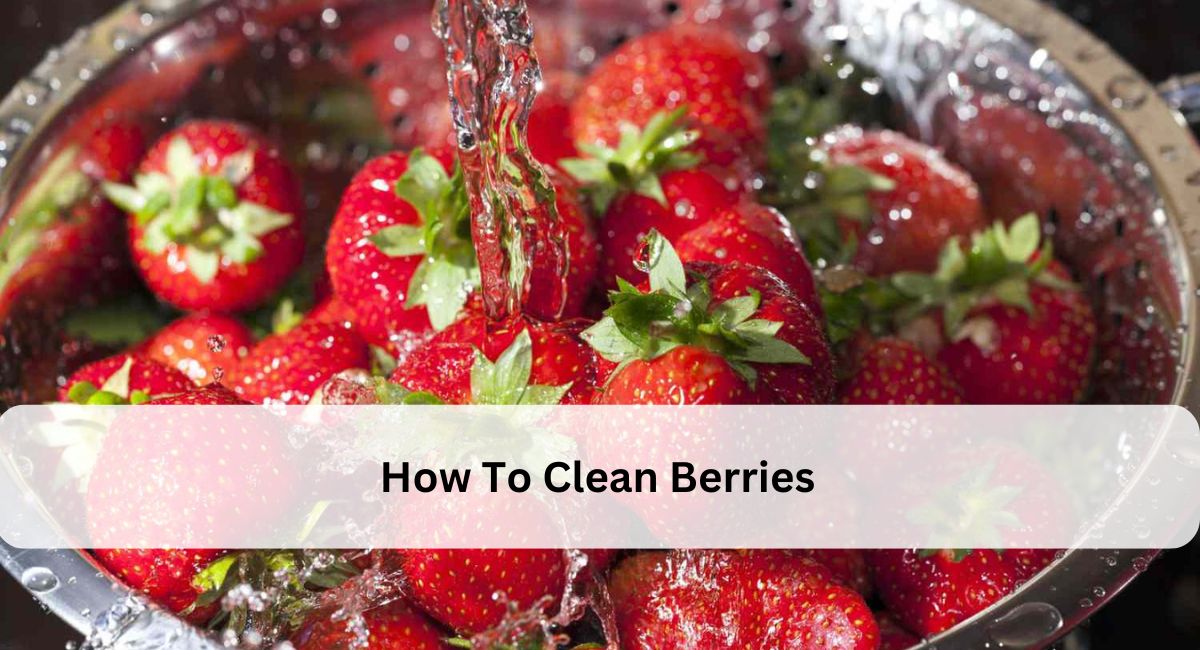Berries, whether they are strawberries, blueberries, raspberries, or blackberries, are delicious, healthy, and versatile fruits. However, they are also delicate and can easily carry dirt, bacteria, and pesticides, making it essential to clean them properly before eating or using them in recipes. In this guide, we will walk you through how to clean berries thoroughly, ensuring that you can enjoy them with peace of mind.
Why is Cleaning Berries Important?
Before we dive into the methods for cleaning berries, let’s understand why this step is so crucial. Fresh berries grow close to the ground and can attract dirt, bacteria, and even harmful chemicals during their journey from farm to table. Washing them properly helps to:
- Remove Dirt and Debris: Berries can sometimes contain visible dirt or invisible debris, such as pesticides, that need to be removed.
- Eliminate Harmful Chemicals: Many conventionally grown berries may have been treated with pesticides or herbicides, which need to be washed off for safety.
- Extend Shelf Life: Proper cleaning can also help keep your berries fresh longer by preventing mold growth.
- Prevent Contamination: Handling and washing berries correctly ensures they remain safe to eat.

How to Clean Berries: Step-by-Step Process
Here are the general steps you can follow for cleaning any type of berry:
1. Choose Fresh Berries
Before cleaning your berries, it’s important to sort through them. Discard any berries that are overly ripe, damaged, or moldy. This will prevent them from contaminating the rest of your batch.
2. Wash Berries Before Eating or Using in Recipes
While it’s tempting to wait until you’re ready to use the berries, it’s best to wash them just before eating or using them. Rinsing berries too early can cause them to become soggy, leading to a shorter shelf life.
3. Prepare a Cleaning Solution (Optional)
If you want to ensure that your berries are as clean as possible, you can use a cleaning solution. While plain water is effective for cleaning most berries, using a vinegar solution can help remove pesticides and bacteria.
To make a vinegar solution:
- Mix 1 part white vinegar with 3 parts water.
- Soak the berries in the solution for 5 minutes to help kill bacteria and remove chemicals.
4. Rinse Under Cold Running Water
For most berries, rinsing under cold running water is enough to clean them thoroughly. Gently place the berries in a colander or a fine-mesh sieve and rinse them for 30 seconds to 1 minute. Avoid scrubbing the berries with a brush, as they are very delicate and could easily bruise.
5. Dry the Berries
After rinsing, use a clean kitchen towel or paper towels to gently pat the berries dry. Be careful not to crush or bruise them during this process.
For extra precaution, you can lay the berries out on a towel in a single layer to air-dry for a few minutes before storing them.
6. Use a Baking Soda Solution (Optional)
If you want an even deeper clean, particularly for berries that are likely to have pesticide residues, you can use a baking soda solution. Baking soda is great for removing some pesticides that may be present on the surface of the berries.
To make a baking soda solution:
- Add 1 teaspoon of baking soda to a bowl of water.
- Soak the berries for about 5 minutes and then rinse thoroughly under cold water.
- Dry with a clean towel.
Best Way to Store Cleaned Berries
After cleaning your berries, storing them properly is key to maintaining their freshness. Here are some tips for berry storage:
- For Raspberries and Blackberries: These delicate berries should be stored in a single layer in a shallow container, ideally lined with paper towels to absorb moisture. Store them in the fridge for up to 3 days.
- For Strawberries and Blueberries: These can be stored in a ventilated container in the fridge. Do not store them with any wet spots, as excess moisture can cause mold growth. It’s best to keep them dry, and if you’ve washed them ahead of time, make sure they are completely dry before storage.
Common Mistakes to Avoid When Cleaning Berries
While cleaning berries seems simple, there are a few common mistakes that could impact their quality and safety:
- Soaking Berries for Too Long: While it may seem like soaking the berries will get them cleaner, soaking them for too long can lead to mushy, waterlogged fruit. Stick to a quick rinse or brief soak.
- Using Soap or Dishwashing Liquid: Never wash berries with soap or dishwashing liquid. These chemicals can leave residues on the berries that are harmful to ingest.
- Storing Wet Berries: Storing wet berries can cause mold to form quickly. Always make sure berries are completely dry before putting them in the fridge.
- Washing Berries Too Early: Washing berries too early can cause them to spoil faster. Wait until you’re ready to eat or cook with them before washing.
What About Frozen Berries?
Frozen berries generally don’t need to be cleaned unless specified by the packaging. If you do decide to clean frozen berries, rinse them under cold water and dry them thoroughly before using them. However, it’s often best to use them directly in smoothies or baked goods without thawing them first, as doing so could change their texture.
How to Clean Organic Berries vs. Conventional Berries
If you’re cleaning organic berries, there is less concern about pesticide residue, but it’s still important to clean them to remove dirt and bacteria. For conventional berries, particularly strawberries, it’s especially important to use a solution like vinegar or baking soda to remove pesticides, as they are commonly treated with chemicals.
FAQs About Cleaning Berries
Can I clean berries with just water?
Yes, rinsing berries under cold running water is typically sufficient to clean them. However, using a vinegar or baking soda solution can provide an extra layer of cleaning.
Do I need to dry berries after washing?
Yes, it’s important to dry berries gently with a clean towel or paper towel to prevent excess moisture, which can lead to mold growth.
Can I clean berries in advance?
It’s best to wash berries just before eating or using them. Washing them too early can cause them to spoil faster.
How can I remove pesticide residue from berries?
Using a vinegar or baking soda solution can help remove pesticides from berries. Rinse them thoroughly under cold water afterward.
Is it safe to clean berries with vinegar?
Yes, using a diluted vinegar solution (1 part vinegar to 3 parts water) is safe and effective in removing bacteria and pesticides from berries.
How long do clean berries last in the fridge?
Cleaned berries should be consumed within 3-4 days for optimal freshness. Store them in a dry, ventilated container in the fridge.
Conclusion: Enjoy Fresh and Clean Berries
Cleaning berries is an essential step to ensure they are safe to eat and free from dirt, bacteria, and pesticides. By following the proper cleaning techniques, you can enjoy fresh, healthy berries in smoothies, salads, desserts, and snacks without any worries. Remember to dry your berries thoroughly and store them properly to maximize their freshness.
By taking the extra time to clean and care for your berries, you’re ensuring that your meals and snacks are as nutritious and safe as possible.


